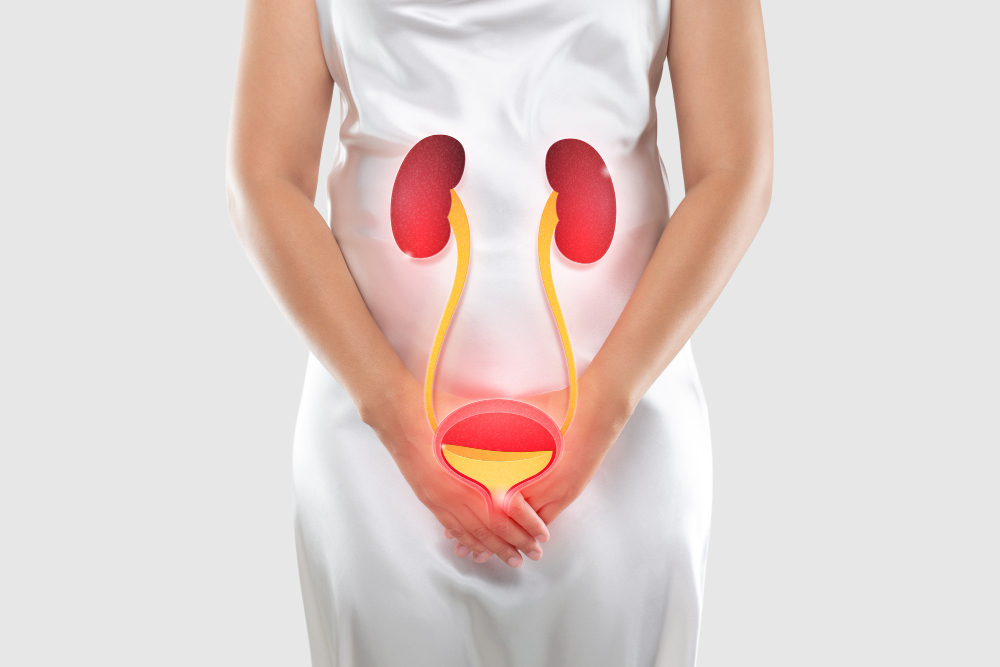
What is Urinary Tract Infection?
Urinary Tract Infection (UTI) is a bacterial infection that can affect any part of the renal tract (kidneys, ureters, bladder and urethra). Most frequently, UTI is termed cystitis, as it is localised to the urethra and bladder. Occasionally, it ascends to the kidneys (causing pyelonephritis).
Types of UTIs
Urinary tract infections (UTIs) can be categorised into several types based on the part of the urinary system they affect.
- Cystitis (Bladder Infection): This is the most common type of UTI, affecting the bladder. It often causes symptoms like a frequent urge to urinate, pain during urination, and lower abdominal discomfort.
- Urethritis: This type involves an infection of the urethra, the tube that carries urine from the bladder out of the body. Symptoms can include a burning sensation during urination and discharge.
- Pyelonephritis (Kidney Infection): A more serious type of UTI that affects the kidneys. Symptoms may include fever, chills, back or side pain, nausea, and vomiting.
Recurrent of Urinary Tract Infection
Recurrent Urinary Tract Infection (UTI) refers to the repeated occurrence of urinary tract infections with two or more infections within six months, or three or more infections within a year.
Unlike a single UTI, which is an isolated incident, recurrent UTIs are characterised by multiple episodes that may be caused by factors such as incomplete treatment of the initial infection, bacterial resistance, anatomical abnormalities, or weakened immune system responses.
These infections often arise from the same bacterial strain, commonly Escherichia coli, and can involve the bladder, urethra, or kidneys.
Recurrent of Urinary Tract Infection Treatment
In refractory cases of RUTI, where conventional treatment with repeated courses of suppression antibiotics have failed, then there is a vaccine for RUTI called Uromune that can be used. This would need to be discussed in detail with your doctor, before commencing treatment.
Urinary Tract Infection Causes

UTIs are MOST COMMONLY caused by the bacterium Escherichia coli (E. coli), which is commonly found in the digestive tract (CAUSING 85% OF ALL UTI’S). The bacteria enters the urinary tract through the urethra and bladder. Once inside, they can travel up to the urethra and bladder and cause an infection.
Certain lifestyle and health-related factors can significantly increase a woman’s likelihood of developing a urinary tract infection (UTI) including:
- Engaging in Sexual Intercourse
- Use of Certain Contraceptives
- Genital syndrome of menopause
- Poor Hygiene Practices
- Dehydration
- Use of urinary catheters
- Existing Medical Conditions (eg. diabetes)
Symptoms of UTI
The symptoms of an Urinary Tract Infection may vary depending on which part of the urinary tract is affected. However, some common symptoms include:
- strong urgency to urinate
- hesitancy
- pain or burning sensation during urination
- dysuria with lower abdominal pain/discomfort
- passing small amounts of urine frequently
- cloudy or foul odour to the urine
- possible blood in the urine
In some cases, an individual may also experience fever, chills, and lower abdominal discomfort.
It is crucial to seek medical attention if you experience any of these symptoms as untreated UTIs can lead to more severe complications such as kidney infections or sepsis.
How are Urinary Tract Infections (UTI) diagnosed in Singapore?
UTI diagnosis process begins with a comprehensive medical history. Our urogynaecologist will inquire about:
- Past UTIs
- Current symptoms and their duration
- Any relevant medical conditions, such as diabetes, which can increase UTI risk
A detailed physical examination follows, focusing on:
- General health
- Specific areas like the abdomen and back to assess for pain
In cases of recurrent UTIs, our urogynaecologist may employ various diagnostic imaging tests to identify any abnormalities in the urinary tract such as:
- Urine test: A urine sample is tested for the presence of white blood cells, red blood cells, and bacteria.
- Uroflowmetry: This test measures the rate and volume of urine flow, which can indicate bladder obstruction or weakness.
- Urine culture: This test helps identify the type of bacteria causing the infection and guides appropriate antibiotic treatment.
- Ultrasound: This non-invasive imaging technique uses sound waves to produce images of the urinary tract, allowing our urogynaecologist to see any structural abnormalities or obstructions.
- An X-ray or CT scan might be necessary to rule out causes of persistent infections, such as urinary tract stones.
If there are indications of blood in the urine or abnormal findings from imaging, a cystoscopy may be recommended. This minimally invasive procedure allows a direct look inside the bladder using a flexible telescope, enabling the assessment of additional conditions that could contribute to recurrent UTIs.
How are Urinary Tract Infections treated?
UTI treatment primarily involves the use of antibiotics, which are effective in eliminating the bacteria causing the infection. It is crucial for patients to complete the entire prescribed course of antibiotics, even if symptoms improve before finishing the medication, to ensure the infection is fully eradicated and to prevent resistance.
Common side effects of antibiotics may include nausea, diarrhoea, and yeast infections, but these should be discussed with a healthcare provider if they occur.
Preventive lifestyle changes are also recommended to reduce the risk of future UTIs such as:
- Increase water intake
- Practise good hygiene
- Urinate regularly
- Choose breathable underwear
- Avoid irritating products
- Consider probiotics
It’s essential to consult our urogynaecologist for a personalised treatment plan, especially in cases of recurrent or severe infections. They can provide guidance on appropriate antibiotic use, identify any underlying conditions contributing to frequent UTIs, and suggest further preventive measures tailored to individual needs.
How are Urinary Tract Infections treated?
UTI treatment primarily involves the use of antibiotics, which are effective in eliminating the bacteria causing the infection. It is crucial for patients to complete the entire prescribed course of antibiotics, even if symptoms improve before finishing the medication, to ensure the infection is fully eradicated and to prevent resistance.
Common side effects of antibiotics may include nausea, diarrhoea, and yeast infections, but these should be discussed with a healthcare provider if they occur.
Preventive lifestyle changes are also recommended to reduce the risk of future UTIs such as:
- Increase water intake
- Practise good hygiene
- Urinate regularly
- Choose breathable underwear
- Avoid irritating products
- Consider probiotics
Can recurrent UTIs be a sign of cancer?
Recurrent urinary tract infections (UTIs) are not typically a direct sign of cancer. However, some symptoms of bladder cancer can mimic those of a UTI, such as frequent urination, pain during urination, and blood in the urine[^1]. It’s important to consult a healthcare professional if you experience recurrent UTIs to rule out any underlying conditions, including the possibility of cancer.
How to Prevent UTI
While UTIs can be treated with antibiotics, prevention is always better than cure. Here are some tips to help prevent Urinary Tract Infections:
- Drink plenty of water: Staying hydrated helps flush out bacteria from the urinary tract.
- Urinate after sex: As mentioned earlier, sexual activity can introduce bacteria into the urinary tract, so it is essential to urinate after sex.
- Practise good hygiene: Wiping from front to back after using the bathroom can help prevent bacteria from entering the urethra.
- Avoid irritating products: Certain types of birth control methods and feminine hygiene products can irritate the urinary tract, making it more susceptible to infections.
For individuals who experience recurring UTIs, your doctor may recommend lifestyle changes or prescribe preventive medication. It is crucial to follow your doctor’s instructions and continue with any prescribed preventive measures to reduce the risk of future UTIs.
UTIs can have a significant impact on an individual’s daily life. The discomfort and pain associated with the infection can be debilitating, and if left untreated, it can lead to severe complications. If you experience any symptoms of a UTI, do not hesitate to make an appointment with our doctor.
Remember, your health is essential, and Dr Arthur Tseng is here to help you maintain a healthy urinary tract.
Disclaimer: The information provided in this article is for general purposes only and should not be considered as a substitute for medical advice. Always consult with your healthcare provider before making any changes to your current treatment plan or starting any new medications.
